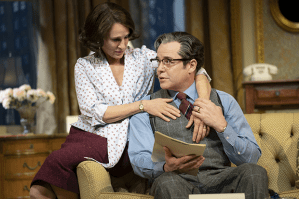Plaza Suite review – Sarah Jessica Parker is a revelation alongside husband Matthew Broderick
Neil Simon’s classic play comes to the West End

The curtain lifts and you are suddenly frozen in time, swept away to the faded glory of Suite 719 at New York’s Plaza Hotel in 1969.
But it’s not just John Lee Beatty’s sumptuously detailed setting, with the New York skyline gleaming through the windows, and the richly plumped cushions of comfortable sofas and beds that carries you back down the decades. It’s the entire tone and demeanour of this revival of Neil Simon’s three comic playlets, loosely bound by being set in the same place.
Starring the Rolls Royce real-life-husband-and-wife vehicle of Sarah Jessica Parker and Matthew Broderick, these three snapshots of battles between the sexes are so rooted in historical attitudes and Simon’s dyspeptic view of the state of his own era that it is impossible to enjoy them as anything but period pieces. And slightly difficult to relish them even as that – though Parker’s enthusiasm for the project is infectious enough just about to carry you through.
The first of the plays is the most substantial and truthful. “Visitor from Mamaroneck” has Parker as Karen, a nervous wife who thinks she is celebrating her 24th wedding anniversary to Sam in the suite where they spent their honeymoon night. In fact, due to her basic inability to master maths, she may be marking the night before their 23rd anniversary in rooms a floor down.
But this error is as nothing to the problems plaguing their marriage since Sam arrives consumed by work, his secretary and by his own unhappiness at getting old, which he signifies by constant vain checks in the mirror and by a refusal to engage with all his wife’s attempts to revive their relationship. As dusk seeps in through the high windows (Brian MacDevitt’s lighting, like Jane Greenwood’s costumes, are miracles of detail and care) the oldest, saddest story in the book unfolds, leaving Karen shaken as she tries to grasp how her life is going to work out.
Parker is wonderful at conveying both Karen’s affection for a man who has stopped seeing her, but also a sardonic strength which means that her behaviour never quite conforms to the stereotype of a downtrodden fool. There’s steel beneath her wit and worrying which makes her position all the more poignant.
Broderick seems to walk woodenly through the role of Sam, never quite engaging. He’s more fun in part two, “Visitor From Hollywood”, in which he plays Jesse Kiplinger, a sleazy Hollywood producer who has never known a flop, who returns from the West Coast to seduce his high school sweetheart Muriel, a ditzy mother of three who avidly follows his success. There’s humour in their attempts to reconnect, but there’s something dark too; in a post Weinstein world, it’s hard to see Jesse as deserving of Muriel’s longing. Simon’s satire about the effects of fame which turns a clumsy dork into a desirable object is sharp, but not quite savage enough. There’s a nasty taste below the hi-jinx.
The final section, “Visitor from Forest Hills”, accelerates into full-blown farce as Parker and Broderick take on Roy and Norma Hubley, father and mother of a bride who has locked herself into the bathroom. Their frantic efforts to persuade her out include a scene where Broderick finds himself on a window ledge attacked by pigeons. But once more it is Parker, resplendent in a broad floral hat, who carries the humour and the emotional heft of the piece, brilliantly charting Norma’s dawning realisation that it is her obsession with surfaces that may be leading to her daughter’s sudden panic about matrimony.
All the pieces, skilfully directed by John Benjamin Hickey, have a deeply jaundiced view of male and particularly female behaviour beneath their smooth surfaces, yet Parker’s honesty, her vigour, and her pure gift for comedy both physical and verbal, disguise some of their obvious shortcomings. She’s a revelation.
















